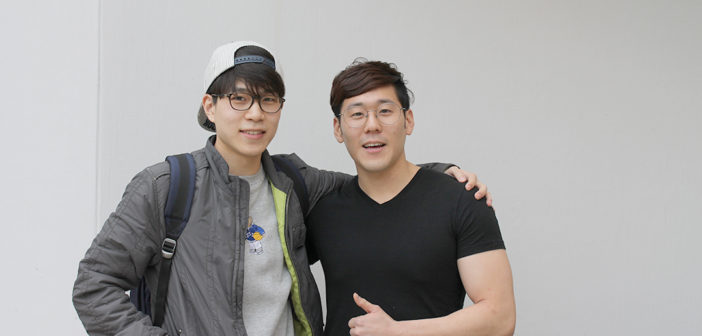There’s a saying in South Korea that a man can only cry three times in his life: when he’s born, when his parents pass away and when he gets drafted for the army.
Ju Yoon Lee, ’18, and Henry Chu, ’19, have already used two of their free passes.
As natives of Seoul, South Korea, Lee and Chu were bound to a mandatory national contract. Every man between the ages of 20 and 30 must serve in the Korean military for a minimum of 21 months. The fact that they were attending an American university did not reprieve them of their duty.
After his freshman year at Lehigh, Lee packed up his room and returned home to begin the rite of passage he had been dreading for years. Chu did the same thing exactly a year later. Up until then, their paths had never crossed, but that was about to change.
The five-week training period at the start of their military duty is the most grueling, Lee said. The “training soldiers,” as they’re called, wake at 6 a.m. every morning to learn how to shoot rifles, throw grenades and fire cannons. They regularly marched 25 miles with 60 pounds on their backs, and their intense workouts included training on land and in water.
But at the end of each day, Lee would return to his bunk and study English. He was worried that without daily practice, he would lose all the progress he had made during his time in America.
“The majority of the people who go into the army think that it’s a complete waste of time,” Lee said. “You can improve yourself, but you can also just waste time. It’s about choosing one or the other, and I chose to improve myself. I was using 30 minutes before bed and 30 minutes after I woke up to study.”
After those five weeks, 10 percent of the training soldiers are selected for a second three-week long training session for specialized work. Much to his dismay, Lee was selected.
He was sent over 300 miles away from home to specialize in eliminating tank mines, a difficult and extremely dangerous task. During these three weeks, he also worked additional jobs, resulting in one to three hours of sleep each night.
When the three weeks were up, the executive officers gathered all of the soldiers in a big room and called out the division to which each were assigned.
“The closer you are to the 3-8 line, the tougher your life is going to be,” Lee said. “At that point, I wasn’t expecting anything. I gave up on everything.”
Lee calls the border between North and South Korea the “3-8 line” because it roughly follows the 38th parallel north. It was the original boundary between the United States and Soviet Union’s brief administration areas of Korea at the end of World War II.
To Lee’s amazement, his name was the very last one called. Among 300 men, he was transferred to the most desired location.
It turned out he got his job because he spoke English better than anyone else. All those hours of studying had paid off. The 17th Infantry Regiment, the division in which he was placed, specializes in U.S. and South Korean combined army training, so top-tier commanders were looking for someone who spoke nearly fluent English.
His job was to sit behind a computer screen all day, creating Excel sheets and PowerPoint presentations that reported how many bullets each crew used on a given day and how many cannons were fired. He would also create a daily schedule for one of the Korean military’s chief commanders. The job usually only involved tedious tasks, but it was important, and at least he was safe.
During the eighteenth month of his military duty, Lee had to select a new soldier that would replace him once he left. The two men would go through a three-month training period in which Lee taught the young man everything he would need to know about the job.
Lee went to the human resources office and asked for a list of that week’s new recruits to the 17th Regiment. He requested their names and the universities they attended.
As Lee browsed the list, his eyes were drawn to one word: Lehigh. It was Chu. He had arrived at the 17th Regiment the day before.
There are 600 training centers across Korea, and this was the week Lee decided to pick his new mentee. If he had requested that list merely days earlier, Chu wouldn’t have been on it.
To put these astonishing odds into even greater perspective, there are approximately 20 Korean exchange students at Lehigh, 15 of which are men. According to Lee and Chu, 10 of those men have already fulfilled their military duty. Out of only 10 Lehigh students who were in the Korean army at approximately the same time, two of them found each other.
“The chance of this happening is the same as winning the lottery,” Lee said. “Probably less than that. So I didn’t look at any others, I was done deciding. I said ‘I’ll take him.’”
Lee hurried to the auditorium filled with the new recruits and called out Chu’s name. Lee approached him and asked, “You go to Lehigh?” Chu nodded. “I go to Lehigh too,” Lee said. Chu stared at him in disbelief.
Lee and Chu spent the next three months together, always by each other’s side. When Chu’s family came to visit two weeks into his training, his parents shook Lee’s hand and said, “Please take care of our son.”
Lee said it’s a request he took seriously then, and still abides by it today.
Lee returned to Lehigh in the fall of 2014, but it wasn’t until last semester that Chu joined him. Reunited after a year and a half apart, they both agree that their incomparable bond has made them closer than ever.
“I don’t want to exaggerate,” Chu said, “but to me, it was destiny.”






Comment policy
Comments posted to The Brown and White website are reviewed by a moderator before being approved. Incendiary speech or harassing language, including comments targeted at individuals, may be deemed unacceptable and not published. Spam and other soliciting will also be declined.
The Brown and White also reserves the right to not publish entirely anonymous comments.
2 Comments
Great story! It’s amazing how Lehigh connects people around the world.
I have been reading the Brown & White for many, many, many years and this is the most well-written, compelling and interesting article that I have ever read in this newspaper. Emily Ward, you’re very talented. I’m so happy that it worked out well for Lehigh’s soul-mates. PS: This article should be reprinted in the alumni magazine.